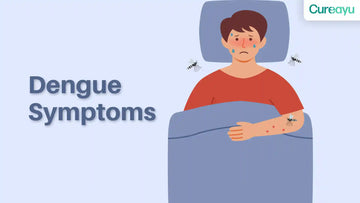Dengue fever, often termed "breakbone fever," is a rapidly spreading mosquito-borne illness caused by the dengue virus. Identifying its symptoms early is crucial to manage its progression and prevent severe complications. This blog explores everything you need to know about dengue symptoms, its causes, treatment options, and preventive measures.
Dengue fever poses a significant public health concern in tropical and subtropical regions. Transmitted by infected female Aedes aegypti mosquitoes, it can range from a mild illness to a potentially life-threatening condition called severe dengue or dengue hemorrhagic fever. Over the past few decades, cases of dengue have surged globally, making awareness of its symptoms and prevention crucial for everyone.
Understanding the early warning signs of dengue can significantly reduce its severity and prevent complications. This blog provides an in-depth overview of dengue symptoms, causes, complications, and ways to protect yourself and your loved ones from this debilitating disease.
Also Read: Effective Home Remedies For Fever: Natural Treatment For Quick Relief
What is Dengue?
Dengue is a viral infection caused by the dengue virus (DENV), which belongs to the Flaviviridae family. The virus has four distinct serotypes (DENV-1, DENV-2, DENV-3, and DENV-4), meaning a person can potentially contract dengue up to four times in their lifetime.
When a mosquito carrying the dengue virus bites a human, it transmits the virus into their bloodstream. The virus then multiplies and spreads, leading to the onset of symptoms. The incubation period (time between infection and symptom onset) typically ranges from 4 to 10 days.
Is Dengue Contagious?
Dengue fever is not directly contagious. It does not spread through human-to-human contact, such as coughing, sneezing, or touching. The disease is only transmitted through the bite of an infected Aedes aegypti or Aedes albopictus mosquito.
Once a mosquito bites an infected individual, it becomes a carrier of the virus and can spread it to others. This indirect transmission makes controlling mosquito populations essential to prevent dengue outbreaks.
Dengue Symptoms
- High Fever
A sudden onset of high fever, often exceeding 104°F (40°C), is the hallmark of dengue fever. This fever usually lasts for 2 to 7 days and may be accompanied by chills and body aches.
- Severe Headache
Patients often report an intense headache, especially behind the eyes, known as retro-orbital pain. This symptom is a classic indicator of dengue fever and can be debilitating.
- Muscle and Joint Pain
Dengue is also called "breakbone fever" due to the severe muscle and joint pain it causes. This discomfort can persist even after the fever subsides.
- Skin Rash
A characteristic skin rash, often appearing 2 to 5 days after the fever begins, is another symptom. This rash can cover the face, arms, legs, and torso and may resemble measles.
- Nausea and Vomiting
Dengue frequently leads to digestive symptoms such as nausea and vomiting, which can contribute to dehydration if not managed properly.
- Fatigue
The virus significantly weakens the immune system, leaving individuals feeling exhausted and lethargic even after the fever resolves.
- Bleeding Tendencies
In severe cases, dengue can cause bleeding gums, nosebleeds, or easy bruising due to a drop in platelet count, a condition known as dengue hemorrhagic fever.
Causes of Dengue
- Aedes Mosquito Bites
Dengue is primarily caused by the bite of infected female Aedes aegypti mosquitoes, which thrive in warm and humid climates.
- Stagnant Water
Aedes* mosquitoes breed in stagnant water sources such as open water containers, discarded tires, and clogged drains.
- Urbanization
Rapid urbanization without adequate sanitation infrastructure creates ideal breeding grounds for mosquitoes, increasing the risk of dengue outbreaks.
- Climate Change
Rising global temperatures and erratic rainfall patterns contribute to the proliferation of mosquito populations, enhancing the spread of dengue.
Also Read: Cold vs Flu: Symptoms, Treatments, and Your Health Action Plan
Complications With Dengue
- Severe Dehydration: Persistent vomiting and high fever can lead to severe dehydration.
- Dengue Hemorrhagic Fever (DHF): Characterized by bleeding, low platelet count, and blood plasma leakage, DHF can be fatal.
- Dengue Shock Syndrome (DSS): A critical complication where blood pressure drops dangerously low, potentially leading to organ failure.
- Organ Damage: Severe cases can affect the liver, heart, or lungs, leading to long-term health issues.
Dengue Prevention
- Eliminate Mosquito Breeding Sites
Regularly empty and clean water containers, and dispose of items that can collect water to prevent mosquito breeding.
- Use Mosquito Nets and Repellents
Sleep under mosquito nets and apply insect repellents containing DEET or picaridin to exposed skin.
- Wear Protective Clothing
Opt for long-sleeved shirts and full-length pants, especially during peak mosquito activity hours (early morning and evening).
- Install Window Screens
Ensure doors and windows are fitted with screens to keep mosquitoes out of your home.
- Community Awareness
Engage in community programs to raise awareness about dengue prevention and control measures.
Also Read: Understanding Food Poisoning Symptoms: A Comprehensive Guide to Signs, Causes, and Treatment
Dengue Treatment
- Hydration
Staying hydrated is crucial to prevent complications like dehydration and maintain electrolyte balance.
- Rest
Adequate rest helps the body recover from the fever and rebuild its immune system.
- Symptomatic Treatment
Medications like acetaminophen can be used to reduce fever and relieve pain. Avoid aspirin or NSAIDs, as they may increase bleeding risk.
- Medical Monitoring
Regular monitoring of platelet count and blood pressure is vital in severe cases. Hospitalization may be required for patients with complications.
Conclusion
Dengue fever is a growing health challenge that requires vigilant preventive measures and prompt treatment. Early identification of symptoms like high fever, severe headache, and fatigue can prevent severe complications. While dengue is not contagious, controlling mosquito populations is critical to curbing its spread.
By eliminating mosquito breeding sites, using protective measures, and staying informed, we can collectively fight dengue and reduce its impact on our communities. Remember, prevention is better than cure, especially for diseases like dengue. Stay safe, stay informed, and spread awareness to protect yourself and your loved ones.












